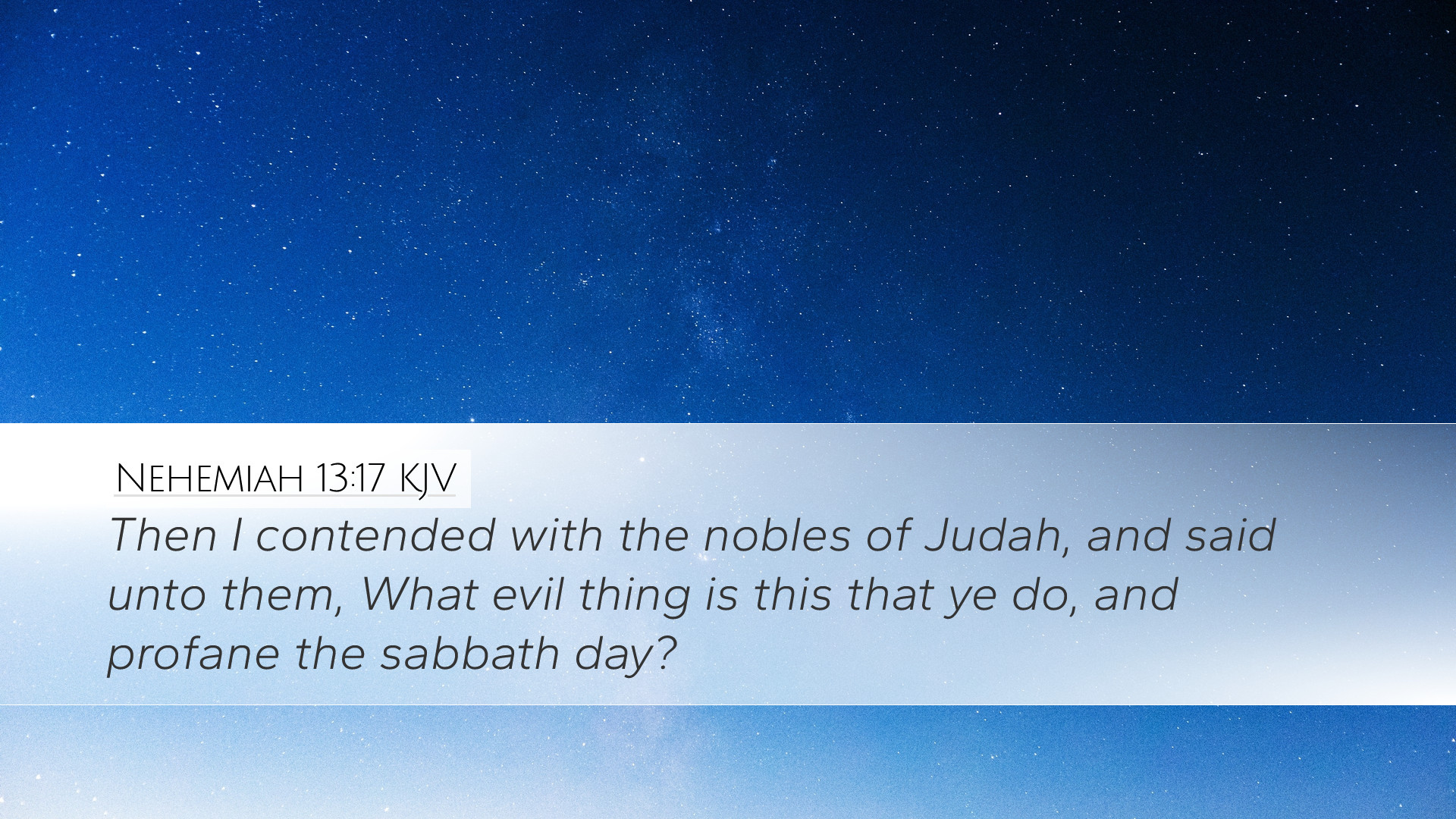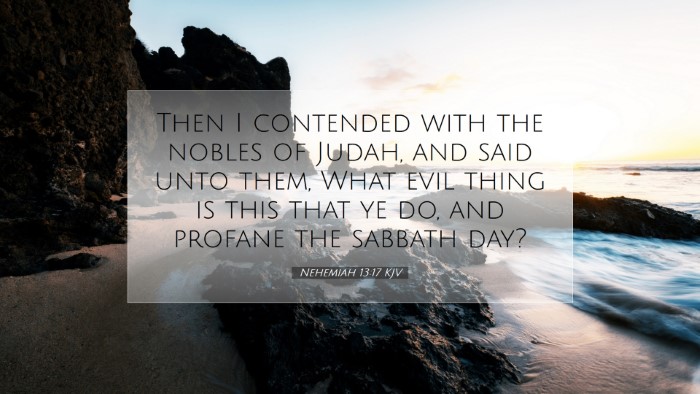Commentary on Nehemiah 13:17
Bible Verse: "Then I contended with the nobles of Judah, and said unto them, What evil thing is this that ye do, and profane the sabbath day?" - Nehemiah 13:17
This verse occurs within the context of Nehemiah's reforms concerning the Sabbath observance after his return from Persia. Nehemiah, as both a leader and a servant of God, saw a deterioration in the sanctity of the Sabbath, leading him to confront the nobles for their negligence.
Contextual Analysis
To understand Nehemiah's rebuke, it is important to consider the timeline and the nature of the Jewish community's practices at the time. After the exile, the Israelites were eager to rebuild their walls and restore their worship, yet, old habits and external pressures began to seep back into their practices.
Historical Background
- The Importance of the Sabbath: The Sabbath was a significant aspect of Jewish life, ordained by God as a day of rest and worship. It was meant to be a perpetual reminder of God’s creation and His covenant with Israel.
- Nehemiah’s Leadership: Nehemiah had returned to Jerusalem with the express purpose of reforming spiritual practices and restoring the community to its covenantal obligations.
Commentary Insights
Matthew Henry’s Perspective
Matthew Henry emphasizes the gravity of Nehemiah's actions in contending with the nobles. He suggests that Nehemiah's righteous anger is rooted in a deep understanding of God’s commands. He interprets the phrase "what evil thing is this" as not just a rhetorical question but a serious indictment against those who were violating a sacred commandment. In Henry's view, the nobles' actions not only dishonored the Sabbath but also represented a larger moral failure within the community.
Albert Barnes’ Analysis
Albert Barnes provides a practical exposition of the behaviors that Nehemiah was addressing. He notes the economic implications tied to Sabbath profanation, where merchants would exploit the faithfulness of the Sabbath for profit. Barnes suggests that Nehemiah's concern was dual-edged: not only was there a religious obligation being ignored, but social injustice was also being perpetuated. He warns how such complacency could lead to a larger spiritual decay.
Adam Clarke’s Thought
Adam Clarke brings attention to the broader theological implications of the verse. He posits that the violation of the Sabbath was emblematic of abandoning God’s commandments. Clarke notes that Nehemiah's fervor in confronting the nobles indicates a leader’s responsibility for the spiritual well-being of his community. He adds that the pursuit of material gain often leads to a neglect of sacred obligations and cautions against allowing such priorities to supersede spiritual commitments.
Theological Reflection
This episode in Nehemiah illustrates a recurring challenge within the faith community: the tension between cultural practices and obedience to divine commandments. The complacency of the nobles reflects a larger human propensity to prioritize earthly pursuits over spiritual obligations.
Significance for Modern Readers
For pastors, students, and theologians today, this passage serves as a reminder of the importance of accountability in spiritual leadership. It presents a call to examine how contemporary practices may unintentionally diminish the sanctity of sacred commitments, particularly in areas concerning worship and communal integrity.
- Encouragement for Righteous Anger: The concept of righteous indignation is displayed through Nehemiah’s actions. This encourages modern believers to stand firm against practices that undermine their faith.
- The Role of Leaders: Leaders in faith communities are reminded of their responsibility not just to lead, but to shepherd their communities back towards faithfulness in observance of God’s laws.
- Importance of Sabbath Rest: Understanding and promoting the Sabbath as a gift from God, dedicated to rest and worship, is crucial for spiritual vitality.
Conclusion
Nehemiah 13:17 serves as not only an admonition against the disrespect of sacred practices but also as a profound reminder of the leader's role in fostering a community that honors God’s commandments. By combining the insights of Matthew Henry, Albert Barnes, and Adam Clarke, we can construct a multifaceted understanding of this singular verse, affirming its lasting relevance and expectation for personal and communal righteousness.


